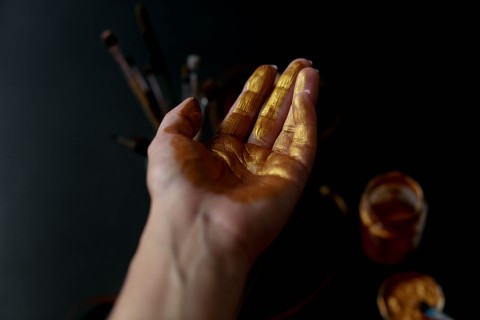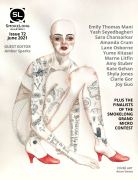We listen to the wind chitter through icicles hanging off the tree limbs and imagine ourselves as ghosts, communicating through breeze and frost. Tucked into the cotton bedding of her childhood, Annie looks the part: a big-eyed waif with bloodless veins.
Growing up poor gives you a good imagination, she says.
I roll over onto my back and stare up toward our secret sky. We’ve just smoked opium and I’m burning up with frozen toes, brain peeling back in onion layers. I should feel safe but I don’t have access to that kind of security, not after a lifetime of people invading me. All I can dig up is a vague presentiment that keeps me from floating as high as I want.
Mind-tethered to the bed, I think of all the reasons Annie used her imagination as a kid, how she escaped with me as we lifted arms high to cast spells that made the trees dance. I told her once that when the leaves flipped up to show their pale green underbellies, it meant a storm was coming—not knowing that in a trailer park storm was the worst kind of profanity.
In summer we left our mothers to their porch gossip and unfiltered cigarettes, the suck and swell of nicotine like communion. We walked the narrow streets of the park and told our stories in disguise, tales of abuse like three Little Rascals stacked in a trench coat. The girl who lives there, Annie said, pointing to a pink trailer with a dent on the side, her brother makes her do things. She didn’t have to say what things. They danced behind my eyes in familiar costumes. When we got back to her trailer I told her I had to pee. I snuck into her brother’s room and squatted on a pile of his clothes, let loose a stream while murmuring he’ll blame it on the cat over and over, like an incantation.
Warm days were for thirst and scorched soles, dancing in the driveway to throbbing and hungry pop music. We found a way out with cautionary tales about the ice-cream truck driver, an old man with leathery skin and a jailhouse tattoo on one forearm. At night we wove our bones back together and tried to find new forms, fresh shapes to bend and fill.
Annie lights a cigarette in the gloom, cherry glowing like a warning. Poisonous red, like the sweater her boss had been wearing. I think of the way we put each new memory up on the shelf at the end of the day. Here a coworker’s hand probing in the break room, there a rumor about our mouths and how we use them. We once imagined ourselves as armored dolls with satin underneath.
You’ll feel better after you eat something, I say, and she nods even though we both have opium-belly, an empty fullness that makes food unappealing.
I drift to the kitchen and heat a pan, slide buttered bread and cheese inside and listen to the sizzle. It’s sloppy, warm, redolent of snow days. I tip the sandwich onto a plate and bring it to her in bed. It sits untouched, both of us breathing it in as we pan for gold in our memories. The weary sense of premonition returns and I lie back, suddenly dizzy as I think of all the times we had to use our imaginations to turn ourselves into specters, to push ourselves out of body and find something better.
Outside, the wind creaks and moans like an old woman. I cover my ears, refuse to hear what she has to say.


